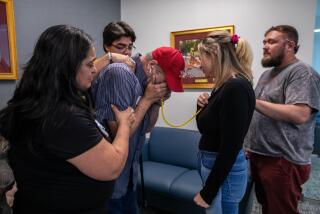Hoag Dropping Heart Transplants : Medicine: Hospital says too few surgeries are being performed to maintain proficiency. Meanwhile, UCI Medical Center begins liver transplant program.
- Share via
NEWPORT BEACH — While one Orange County hospital announced it will stop performing heart transplants, another hospital on Tuesday launched a liver transplant program.
Hoag Hospital said this week it will stop performing heart transplants because it is not doing enough of the highly specialized surgeries to maintain proficiency.
Executive Director Larry Ainsworth said growth of the hospital’s 5-year-old program has been hampered in part by a shortage of donor hearts, a byproduct of successful efforts to reduce highway deaths by discouraging drunk driving and promoting the use of air bags, infant car seats, motorcycle helmets and seat belts.
“The bottom line is that there are a lot of trends that are great for public safety but (have) reduced the number of donor organs,” said Ainsworth. “If we were able to transplant every patient within a few months, we would probably see significant increases in surgeries and stay in the program.”
Ainsworth said that since Hoag began doing heart transplants in 1987, the number of patients receiving new hearts at the Newport Beach hospital has stagnated. The cost of the surgery alone is about $100,000.
“Over five years, we have done 35 transplants for an average of seven a year and we feel we ought to be doing 12 to 18 a year,” Ainsworth said.
A minimum of 12 heart transplants a year is required for heart transplant programs to meet Medicare standards and voluntary guidelines established by the United Network for Organ Sharing, a national center that administers organ procurement and transportation.
Ainsworth said Hoag’s patients have attained a survival rate of 79% one year after surgery, which exceeds the one-year survival rate of 75% required for Medicare certification.
He said the decision to stop the surgeries was made jointly by physician members of the transplant team and the hospital administration.
Ainsworth said the four patients on the waiting list for a heart transplant will have the option of having the procedure performed at Hoag or another hospital. He said the hospital’s cardiologists will continue to offer preoperative assessments of other heart transplant candidates and follow them after they have received donated hearts.
Loss of the Hoag program leaves Orange County with one heart transplant program, at UCI Medical Center in Orange, which on Tuesday performed its first liver transplant.
A UCLA Medical Center’s liver transplant team completed the liver transplant at UCI Medical Center. The patient, 26-year-old Karlyn Farris of Altadena, was listed in good condition after the five-hour surgery.
Hospital officials said they were initiating a cooperative liver transplant program at UCI to better serve the Orange County area while enhancing the patient care, research and teaching missions of both university hospitals and avoiding duplication that can boost medical costs.
Dr. Lynne Stevenson, medical director of the heart transplant program at UCLA, which is the largest program in Southern California, said there is a national crisis in the shortage of donor organs. She noted that in 1988 there was a national waiting list of 1,000 patients for donated hearts. Currently, she said, the waiting list has expanded to 2,800 heart patients and continues to grow monthly.
Stevenson also said insurance companies and health maintenance organizations are promoting consolidation of complicated procedures like organ transplants to fewer hospitals for cost savings and to gain experience and research from larger caseloads.






